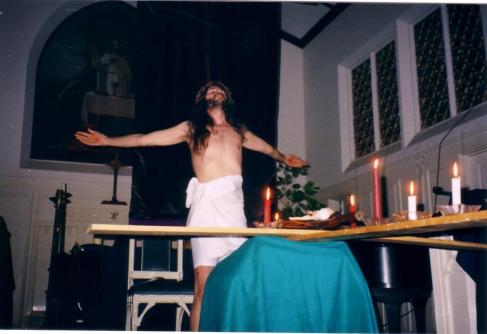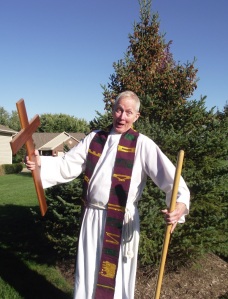Whoever does not take up his cross and follow in my steps is not fit to be my disciple. Whoever tries to gain his own life will lose it; but whoever loses his life for my sake will gain it.
[Jesus’ 12 disciples are sent out on a mission trip with these instructions. For background see Days 83-84.]
When I think about taking up one’s cross it’s hard not to think about George. Nobody loved their crosses more than George. Good Friday was his very favorite holiday and he would gleefully pass out cross-shaped cookies and nails for our hands. He loved to strip down to his skivvies and pretend to be Jesus on the cross. Over the years he built bigger and bigger crosses for himself. When the church got rid of its pipe organ he used the biggest wooden pipes to build a giant cross for himself. As the only person who had any real enthusiasm for Good Friday, we tried putting George in charge the Good Friday services for a couple of years. After making us all watch the bloodiest portions of “The Passion of the Christ,” Mel Gibson’s popular homage to violence, he followed up the next year by dragging the giant pipe organ cross all around the church, complete with a lot of falling and moaning. He also rebuffed all efforts by others to help him with that thing. And he was, of course, almost naked. After that we went in another direction.

George doing one of his Good Friday reenactments.
If you remember what I wrote about “the bridegroom” on Day 78, you know that the church has sometimes come up with what are, at best, questionable interpretations of the words of Jesus. This beloved scripture may be one of those cases.
It seems that there is some confusion about the word “cross” in Greek when it’s translated into English in this particular scripture. The problem is outlined in this Jewish commentary from http://bethaderech.com/take-up-your-cross-daily/ (fyi “Yeshua” is the Hebrew name for “Jesus”):
Now, the word used for “cross” in Greek is Stauros – “a stake or post” from the Greek word histemi “to stand.” Stauros does not mean “cross” per se. But, rather, it means “a standing beam.” The Aramaic word for “to stand” is z’kaf. In the Aramaic Peshitta, the words used for “take up his cross” are oon’sh’qool z’kifa. Oon’sh’qool – “and he takes up (as with the hands) ”Z’kifa – n. “cudgel” “club” “rod” from the Aramaic word Z’KAF “to stand.” The word came to mean “rod” because Z’KAF, in addition to meaning “to stand” means “to lift up” or “to take up (as in one’s hand).”
A cudgel or rod was one of the primary tools of the shepherd. The rod specifically was used as a weapon to defend the flock. Idiomatically, to “take up the rod” was to pursue the work of the shepherd and defend the flock.
Thus, to the Semitic mind, what Yeshua was saying was that one must “take up his rod.” Now what does that mean exactly?
The Jewish Scriptures say:
- Exd 4:17 And thou shalt take this rod in thine hand, wherewith thou shalt do signs.
- Exd 4:20 And Moses took his wife and his sons, and set them upon a donkey, and he returned to the land of Egypt: and Moses took the rod of God in his hand.
- Exd 7:20 And Moses and Aaron did so, as God commanded; and he lifted up the rod, and smote the waters that [were] in the river, in the sight of Pharaoh, and in the sight of his servants; and all the waters that [were] in the river were turned to blood.
- Num 17:9 And Moses brought out all the rods from before the LORD unto all the children of Israel: and they looked, and took every man his rod.
To “take up the rod” means to prepare to do the work of God. This at once demonstrates willingness and action. In other words, in order to follow Yeshua, one need not be willing to die for him, but rather willing to live for him.
I confirmed this information in Wikipedia:
Stauros (σταυρός) is the Greek word, usually translated cross, that in the Bible is used in reference to the device on which Jesus was executed. The meaning of the word has changed over the centuries. The word stauros comes from the verb ἵστημι (histēmi: “straighten up”, “stand”). In Homeric and classical Greek, until the early 4th century BC, stauros meant an upright stake, pole, or piece of paling, “on which anything might be hung, or which might be used in impaling [fencing in] a piece of ground.” In the literature of that time it never means two pieces of timber placed across one another at any angle, but always one piece alone.
So this is another one of those words that has evolved to have a different meaning when used by Christians (See Day 74 about the “Son or Man” or Day 95 about the “sword”). After Jesus was crucified, the meaning of the word changed to exclusively mean the Roman instrument of torture. So, before the crucifixion, it’s likely that he was almost certainly using the pre-Christian meaning – a rod or stake.
In the January 2013 issue of the Nehr HaOlam, the newsletter of the Messianic Bible Society, Kehilla Beth HaDerech argues that the traditional Christian interpretation of this passage is incorrect based on both linguistics and Jewish thought. Here are a few excerpts from this very detailed article:
Most believers may reason, teach, and even argue that this quote implies that people should be willing to mortify their flesh and die for Yeshua; however, a closer look into this passage documented in Luke 23 along with some sound Semite insights will shed some light into the matter.
I reason that this passage is all about taking the mantle of leadership and not about subjecting yourself to martyrdom or even wearing a cross. As opposed to causing physical harm to your body, Messiah desires for you to deny your own personal “selfish” ambitions and take your place with him in providing service both to Hashem and fellow members within the body of Messiah Yeshua. Yeshua believed and taught that the way to shalom (i.e. harmony) is through service to others and to G-d, denying or losing the personal inner self.
To conclude, understand that to take up the rod means for you to do the work that G-d has placed in your hands. By you doing so, it demonstrates an immediate willingness and action to provide service both to G-d and towards other. Instead of being willing to inflict any harm to your body or even submit yourself to martyrdom, be willing to live for Yesua and have a fair share in spreading the Good News.
Thus forth, I am ever mindful that with a lowly shepherd’s staff, the Heavenly Father instructed Moses to go into Egypt, deliver an enslaved nation, perform great signs and wonders, and lead Israel into freedom. In my selfless mind, I reason that Messiah recognized that within me when he told me to take my staff and follow him, a very Jewish thing to do.
This extensive article also goes into detail about both his interpretation of this scripture, as well as more about the words z’kifa and stauros. It’s worth reading. See http://nehrhaolam.weebly.com/uploads/1/2/7/4/12743541/emag.pdf.

John is confused about which one he should use.
So the question is this: was Jesus telling his disciples to be leaders or victims? Is he saying “Get to work” or “Seek suffering?” Is he asking them to pick up an instrument of authority, or an instrument of torture?
I am not a linguistic expert nor do I presume to know what the “true” interpretation for anything in the Bible. I do, however, have a certain amount of common sense and I find myself asking these questions about this passage and it’s context within the bigger picture:
- What is the purpose of this mission trip Jesus is sending his disciples on? (To teach about the kingdom of God, to heal – Day 83).
- Did Jesus send the disciples out to confront local authorities? (No, he said to stay only where they are welcomed – Day 86).
- Did Jesus ever impose suffering on himself or engage in any ascetic practices? (No, he didn’t even like to fast – Day 78).
- Did Jesus ever induce suffering or make people sick so that the Kingdom of God might be revealed? (No, he healed people).
- Did Jesus ever preach that murder or human sacrifice was a good thing? (No, he reversed it by raised people from the dead and encouraging others to do likewise – Day 81 & 84).
- Did Jesus say that the disciples might be persecuted? (Yes – Day 88).
- Did Jesus ever say persecution was a good thing that would advance the Kingdom of God? (No, although he said that if they were taken to court the Gentiles would hear their testimony – Day 88).
- Is martyrdom an important concept in Jewish history? Do they have lots of stories in the Torah celebrating martyrs? (No).
- Does Jesus encourage his followers to be leaders? (Yes – Days 16,70,75,83).
- Did any of Jesus’ disciples die on this mission trip? Were any of them martyred? (No, they were all with him until the end).
- Did any of Jesus’ disciples suffer persecution on this trip? (It is not mentioned; presumably not any serious persecution).
- What is the precedent for the rod interpretation? (Moses and his rod).
- What is the precedent for the sacrificial cross interpretation? (The pagan practice that says that the gods can be appeased only through human or animal sacrifice – Day 18).
- Did Jesus preach that the Kingdom of God would come as a result of violence? (No, Jesus believed the Kingdom of God would come through peace – Days 13 & 34).
- Do certain people believe that good things can be achieved through violence? (Yes, as in “just wars,” martyrdom, or the idea that the death of a loved one can be a “good thing” because it “raises awareness” of some vile issue).
- Is the cross/martyrdom interpretation more consistent with pagan notions of human sacrifice or Jesus’ teachings about the Kingdom of God? (Pagan notions).
According to my personal way of thinking, I believe that martyrdom is inconsistent with Jewish thinking and with Jesus’ teaching. It seems illogical that he is telling his disciples that they must martyr themselves to accomplish what he wants done on this mission trip, nor do I think that he is saying that they must suffer. I think that the usage in this scripture of the word “stauros” in Greek is very clever. It’s a double-entendre that simultaneously looks back to the work of Moses and ahead to the martyrdom of Jesus. Unfortunately this Greek cleverness doesn’t translate into English. One would have to say, “pick up his rod, his cross…” One would have to use both words to get the complete nuance of the Greek word. The argument is that if you have to choose only one word, “rod” would be more accurate relative to what Jesus was trying to say to his disciples.
As for the meaning of verse 39 – Whoever tries to gain his own life will lose it; but whoever loses his life for my sake will gain it. – it depends on how you translate verse 38 (about the cross). Obviously, Jesus is telling his disciples that if they want to live only for themselves and their selfish interests, then their lives will be wasted (lost). But the second part encourages the disciples to accept the challenge to live for others, presumably by picking up their “stauros.” If they decide to give up everything else and follow Jesus, their lives will have great meaning. So, if you want to try to apply all of this to your own life you have to make a decision based on the translation of this word “stauros.”
- If you think Jesus wants you to pick up a Christian “cross”, then losing your life means you should look for every opportunity to confront your enemies and tempt them to kill or torture you so that God will be pleased- as opposed to looking for peaceful solutions and working for substantive institutional change.
- If, however, verse 38 refers to a “rod”, then like Moses you should step outside your comfort zone and dedicate your life to leading people to freedom and standing up for justice regardless of the personal cost.
Sometimes The Message version of the Bible, which uses contemporary language and metaphors, can be helpful. In this case it’s somewhat noncommittal because it avoids the issue of using either “cross” or “rod”: “If you don’t go all the way with me, through thick and thin, you don’t deserve me. If your first concern is to look after yourself, you’ll never find yourself. But if you forget about yourself and look to me, you’ll find both yourself and me.
But, at the end of the day there is ambiguity here. The Greek word stauros has two meanings – “upright stake” (rod) or “cross.” You are free to decide which one you want to pick up as you follow Jesus. Or pick up both. You choose.
I know I could never convince Good Friday enthusiast George that this passage refers to anything other than a Roman cross of torture, and I would never even bother to try. He eventually quit our church and went back to the Roman Catholic Church were they had more respect for blood and guts and martyrdom and murder. At our church we were more about empowerment and healing and life and joy. And we never really, in our hearts, thought that the death of Jesus should be a cause for either self-centered celebration about “liberation from sin” or self-mutilation, shame, and self abasement. In my opinion the only appropriate response to Good Friday is deep regret, heartfelt remorse, and profound unspeakable sorrow for all of mankind. A time to contemplate the horror of this atrocity. My personal response – we can do better. We must do better. And so at this point I pick up my rod – or in this case my virtual pen – and try to give up a little piece of my life trying to study and promote this amazing Jesus whom I have chosen to follow.
What does this scripture say to you?
 But apparently Jesus’ promises of thrones in the New Age, restitution for all the comforts they have forsaken, and eternal life were not enough for this mother and her sons. They wanted special assigned seats of near Jesus. They want to be first among the disciples. They want to be recognized as being the best. Big mistake. You would think they would all know better. Instead of being grateful for the great gifts that Jesus has already promised them, they wanted more. Jesus responds by saying that he’s not the one in control of the New Age seating chart. He says that God is the one who makes that decision.
But apparently Jesus’ promises of thrones in the New Age, restitution for all the comforts they have forsaken, and eternal life were not enough for this mother and her sons. They wanted special assigned seats of near Jesus. They want to be first among the disciples. They want to be recognized as being the best. Big mistake. You would think they would all know better. Instead of being grateful for the great gifts that Jesus has already promised them, they wanted more. Jesus responds by saying that he’s not the one in control of the New Age seating chart. He says that God is the one who makes that decision.


